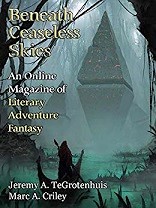 Beneath Ceaseless Skies #258, August 16, 2018
Beneath Ceaseless Skies #258, August 16, 2018
“The Wyvern Rider and Those of the Land” by Jeremy A. TeGrotenhuis
Reviewed by Victoria Silverwolf
Both stories in this issue feature fantastic settings and unlikely allies fighting forces of evil.
“The Wyvern Rider and Those of the Land” by Jeremy A. TeGrotenhuis is set in a world where many different beings fly above an eternal, raging storm. Some are bird-like humanoids. Others ride dragons. The protagonist, who commands a fleet of airships, is a composite entity made up of four souls joined together. Before the story begins, users of ancient technology capture one of the souls. The protagonist must agree to help a dragon-rider, whose people are often foes of those with multiple souls, in order to pursue their common enemy.
This fast-moving tale of adventure has a complex background, requiring careful reading. The theme of one person with multiple souls is a unique one. Other aspects of the story are not so original. The author uses the word Laputa to refer to floating communities, an allusion to a flying island in Gulliver’s Travels. Since Jonathan Swift’s intent was satiric, this reference creates the wrong expectations in a story that is completely serious.
The narrator of “Shattered Hand” by Marc Criley is a crustacean-like being, traveling with a woman who has a prosthetic hand. Together they cross a desert wasteland, pursued by foes, to a place that transports them elsewhere. Here they confront the entity that rules over both their kind, claiming body parts of its subjects for its own purposes.
This violent tale has an exotic background and unusual characters. Not everything that happens is completely clear. The author uses the informal word “okay” in dialogue, which clashes with the otherworldly feeling of the story.
Victoria Silverwolf has read Gulliver’s Travels, and thinks “okay” should be spelled “OK.”